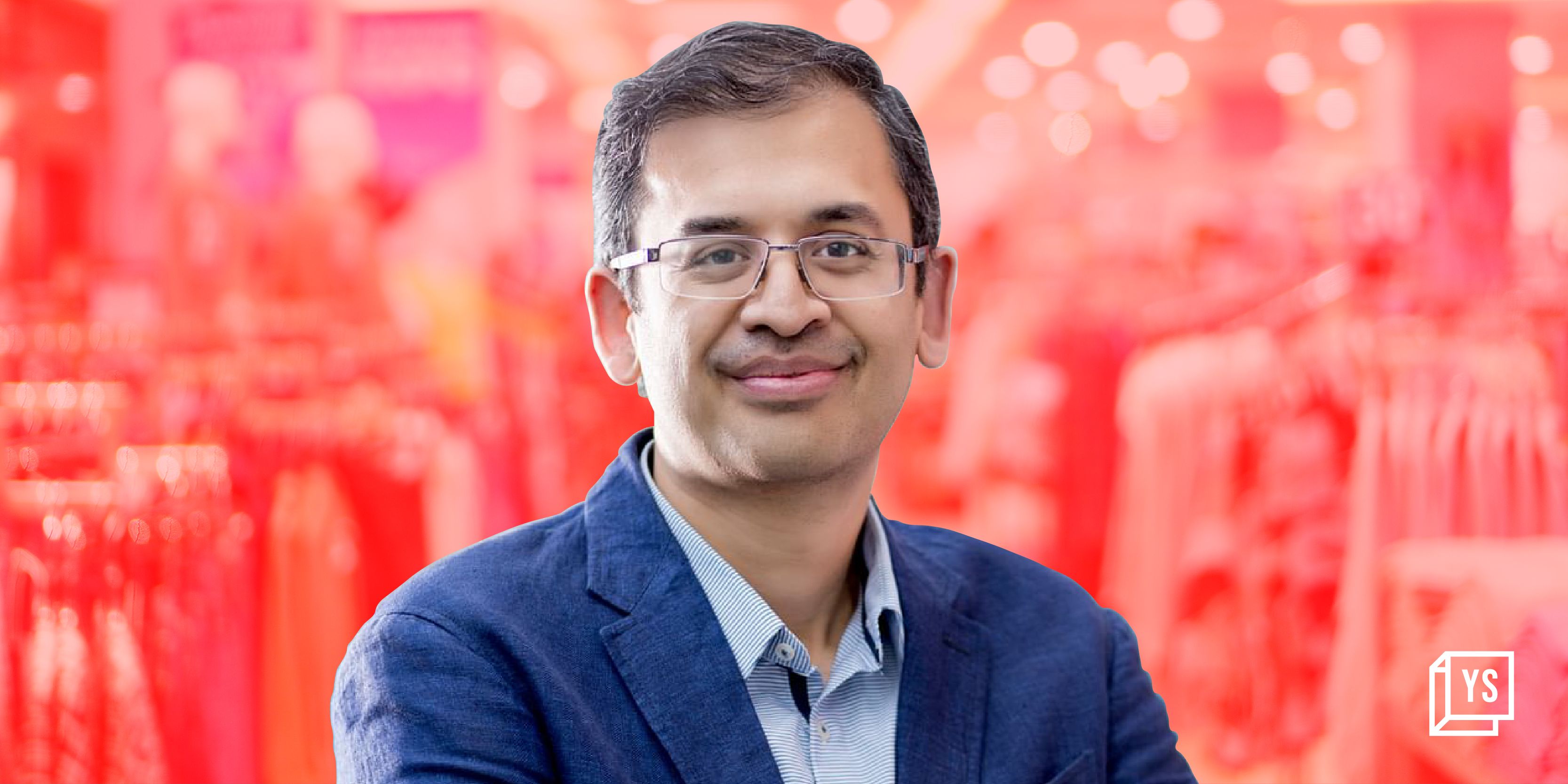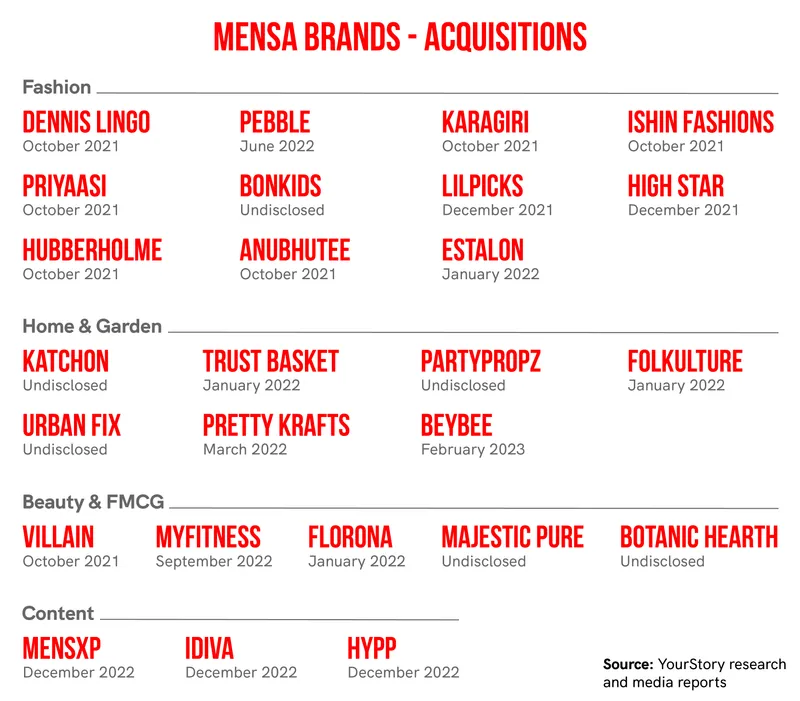Mensa's Ananth Narayanan banks on offline strategy to unlock roll-up brands’ next growth phase
In an exclusive interview with YourStory, the Founder and CEO of Mensa Brands explains why more brands from the startup’s portfolio are taking the omnichannel route for growth, even as the company slows down on acquisitions in a tough market.
Sowmya Ramasubramanian

Thursday June 15, 2023 , 5 min Read
Tiger Global-backed is set to launch its first exclusive retail store for men’s casual wear brand Dennis Lingo in Mumbai’s Phoenix Market City mall this week, Founder and CEO Ananth Narayanan tells YourStory.
The store is part of the house-of-brands firm’s strategy to help its portfolio brands tap into the offline market.
Dennis Lingo is the fifth brand from Mensa’s portfolio to set up its offline presence. Its other brands Pebble (consumer electronics), MyFitness (FMCG), Villain (men’s personal care), and Priyaasi (jewellery) have a presence across general trade, modern trade and exclusive brand outlets.
In an exclusive interview with YourStory, Narayanan spoke about Mensa's omnichannel strategy, the slowdown in acquisitions, and growing competition in the house-of-brands space.
According to Narayanan, who was previously the CEO of fashion ecommerce platform and later pharmacy chain Medlife, offline retail is a natural progression for direct-to-consumer (D2C) brands beyond the Rs 150 crore run rate.
“For fashion, the math is north of Rs 150 crore with enough products selling in enough pin codes for offline to start making sense. Anytime you cross 10,000 orders a day, it starts to make sense,” says Narayanan, adding that apart from Dennis Lingo, Hubberholme, High Star, Ishin, Priyaasi and Karagiri have crossed the threshold.
For Dennis Lingo, Mensa wants to start with five company-owned-company-operated stores before opening up the brand to franchisees in 12 months’ time.
"Our primary objective over the next three to four years is to transform Dennis Lingo into a Rs 1,000 crore brand by leveraging a captivating combination of exclusive products, attractive deals, exceptional UI/UX, and impactful brand campaigns. Currently, the brand is generating monthly revenue of Rs 18 crore, representing a 6X growth," Romil Jain, Founder at Dennis Lingo tells YourStory.
While fashion as a category needs certain run-rate to connect with users offline, other categories like beauty and personal care can start selling offline faster.
“In the case of beauty, you can go offline. Villain, our perfume brand sees nearly 50% of sales from offline. MyFitness, which is our FMCG brand offering peanut butter, again sees 30% to 50% sales coming in from offline,” he adds.
With 26 brands in its portfolio including content platforms iDiva and MensXP, roll-up ecommerce platform Mensa has seen close to 10 ‘breakout brands’, including Dennis Lingo and Pebble.
“We have slowed down on acquisitions,” Narayanan tells YourStory. “We are looking for something in athleisure which we don’t have. We are looking for a brand in the beauty-Ayurveda space which we don’t have. One of our largest brands, Botanic Hearth, which is one of the best-selling beauty brands on Amazon US is something we plan to bring to India.”
Mensa also continues to receive nearly 21% to 22% of global sales from brands it has been working within the US.
Last year, the company had said it plans to build 300 brands worth more than Rs 1,000 crore in the next 10 years.

Infographic by Nihar Apte
Funding and competition
Founded in 2021, Mensa was valued at over $1 billion within six months of inception in November 2021—it is the fastest Indian startup to reach this milestone—and has raised $201 million to date in equity funding.
Its latest fundraise was in February this year when it raised Rs 300 crore debt to fund future brand acquisitions.
In terms of portfolio brands, Mensa is one of the largest players in the roll-up ecommerce category. GlobalBees, which has more than 40 brands listed on the website and has raised more than $250 million at a valuation of over $1.1 billion, is a tough competitor.
While the company does not have plans to raise an equity round of funding immediately, it has cut down on spending to conserve capital. Mensa also recently let go of nearly 30 employees across MensXP and iDiva verticals to streamline operations.
“In a difficult macro environment we continue to grow and be operationally profitable,” Narayanan says, adding that Mensa has also managed to control marketing spends by using MensXP and iDiva for brand building. All of Mensa’s brands are profitable, he says.
The company earned a revenue of $41.2 million or Rs 310 crore in FY22 (its first year of operations) with a loss of Rs 16 crore. It spent Rs 670 crore on acquisitions.
“We continue to reduce supply costs…I am also a huge believer in tech. If you can do cataloguing using generative AI, if you can use tech for pricing you don’t need an army of people to do this. We are adding people for this. We have 10 people in data science who are doing interesting work on pricing and inventory,” he added.
Apart from Lightspeed-backed GlobalBees, Mensa competes with other smaller players like UpScalio and GOAT Brand Labs. However, the rival firms have relatively smaller portfolios of fewer than 15 brands each, according to data from the market intelligence platform Tracxn.
Speaking about growing competition in the house-of-brands space, Narayanan says that the influx of many players is a great validation of a good idea. “There's a huge value proposition in having more brands that come. And I think more will be better,” he adds.
However, other players have shown signs of a slowdown. UpScalio, backed by Gulf Islamic Investments, downsized its workforce by 15% to focus on cutting costs and improving profitability.
Mensa’s growth hasn’t been without hurdles. Bo International, the parent of aromatherapy brand Florona that it acquired in January 2022, has initiated litigation against Mensa for an alleged breach of contract, according to a Moneycontrol report earlier this week. Mensa has denied the claims made by Bo International and Founder Aayush Gupta.
(Cover image and infographic by Nihar Apte)
The story was updated to add a quote.
Edited by Affirunisa Kankudti







